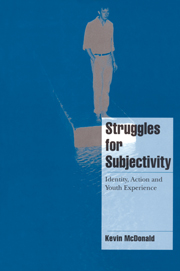Book contents
- Frontmatter
- Contents
- Acknowledgements
- Research participants
- 1 Introduction: subjectivity and social experience
- PART I The end of a working-class experience
- PART II Postmodern crisis: navigating the flow
- 7 None of the above: contemporary experiences of the gang
- 8 You'll be forgotten: visibility and mobility of graffiti writers
- 9 Between the body and the self: the anorexic terrain
- 10 We stand up for what we are: ethnicity and Aboriginality
- 11 Conclusion: struggles for subjectivity
- Bibliography
- Index
- Title in the series
11 - Conclusion: struggles for subjectivity
Published online by Cambridge University Press: 05 December 2011
- Frontmatter
- Contents
- Acknowledgements
- Research participants
- 1 Introduction: subjectivity and social experience
- PART I The end of a working-class experience
- PART II Postmodern crisis: navigating the flow
- 7 None of the above: contemporary experiences of the gang
- 8 You'll be forgotten: visibility and mobility of graffiti writers
- 9 Between the body and the self: the anorexic terrain
- 10 We stand up for what we are: ethnicity and Aboriginality
- 11 Conclusion: struggles for subjectivity
- Bibliography
- Index
- Title in the series
Summary
This book set out to explore young people's experience of a new social model, one of change and movement rather than fixed structure and institutions. Its development has led some commentators to celebrate a postmodern social world, where all forms of social structure potentially dissolve into a patchwork of microcultures and where society gives way to a multiplicity of tribes (Maffesoli 1996). Others are deeply pessimistic, part of a long social science tradition worried that modern society involves increasingly powerful and pervasive forms of social control or regulation. This can be seen in literature from Weber's concern about the nature of western rationality (1904) to the Frankfurt school and Marcuse's critique of one-dimensional humanity (1967). Contemporary examples of this orientation, such as Rose (1996) and Turner (1984), draw on the work of philosophers such as Foucault, arguing that not only the social world but our very subjectivity are the products of all-pervasive forms of power. These authors see social life as an expression of ‘governmentality’ (Rose 1996), where we are trained from birth to internalise the imperatives of pervasive systems of regulation. But the experiences we have encountered in this book underline the inadequacy of both approaches. The idea that the social world is an all-embracing network of governmentality shaping our inner desires seems disconnected from real social practices, crises and struggles. Equally, although the idea that we live in a postmodern world of freedom where we can reshape ourselves at will captures much of contemporary consumer culture, it fails to make sense of the young people's experiences.
- Type
- Chapter
- Information
- Struggles for SubjectivityIdentity, Action and Youth Experience, pp. 202 - 219Publisher: Cambridge University PressPrint publication year: 1999



